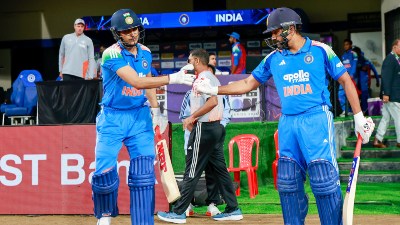Blacked out Mughals
As part of the Pravasi Bharatiya Divas jamboree in New Delhi, the National Museum organised an exhibition on Indian artistic tradition throu...

As part of the Pravasi Bharatiya Divas jamboree in New Delhi, the National Museum organised an exhibition on Indian artistic tradition through the centuries. Paintings and sculptures were selected keeping in mind the exhibition8217;s theme: 8216;8216;The male and female form significant representations in Indian art.8217;8217;
But, amazingly, Mughal miniatures and paintings from the Deccani school were missing from the show. This absence was all the more striking considering that there were examples from the same period of every other Indian school of painting, including Pahari, Kangra, Tanjore, Malwa, Basholi, Bikaner, Kisangarh, and Sikh.
The blackout of Muslim Indian art was despite the introductory reference to the exhibition, proclaiming that the collection was meant to portray the 8216;8216;unity in diversity that Indian civilisation represents by approaching various cultural and artistic streams over the ages.8217;8217; Has the Culture Ministry decided to take its cue from Murli Manohar Joshi8217;s HRD ministry?
One Sided Match
FICCI and the Ministry of External Affairs were partners in organising the Pravasi Bharatiya Divas conference. Since both sides spoke of an arrangement of 8216;8216;matching costs8217;8217;, most assumed that the expenses would be split down the middle. But in the MEA8217;s first major experiment with privatisation, it looks as if the private sector partner will be cashing in at the expense of the Government, thanks to a rather one-sided arrangement.
The contract between the two stipulates that the MEA will reimburse FICCI for expenses incurred up to a maximum of Rs 5.5 crore while FICCI gets to keep all the money it raises from ticket collections for 3,000 delegates plus various corporate sponsorships.
The deal was worked out on the understanding that the cost would come to around Rs 11 crore, an estimate provided by FICCI. The final accounts have yet to be worked out and though FICCI secretary general Amit Mitra says he fears that FICCI may end up in a loss considering unforeseen expenses, one has a sneaking suspicion that it is the MEA which is the real loser in the deal.
Kept in Background
Logically, B K Agnihotri should have been one of the leading lights of the Pravasi day functions, but except for a brief appearance on the dais at one of the plenary sessions, the Ambassador at Large for NRIs and PIOs kept away from the limelight.
The MEA didn8217;t miss the opportunity to take down Agnihotri a peg or two. Agnihotri was downgraded in the seating arrangement at the various lunches and dinners. He was even advised not to field any questions from the delegates unless they were given to him in writing.
The mandarins of South Block, already fuming over Agnihotri8217;s installation in the first place, hit the roof after Agnihotri confided to an Indian Express correspondent that his job included overseeing our ambassadors abroad.
Although he tried to claim that he had been misquoted, South Block seized on his lapse to build up a case that since highly sensitive issues on foreign relations might crop up at the conference, it was best that he did not answer them without first getting a proper input from the Foreign Office.
Governing Principle
At the governors8217; conference, former Organiser columnist and Pondicherry Lt Governor K R Malkani quizzed the Prime Minister about a remark of his which was contradicted by Pakistani President Pervez Musharraf.
Vajpayee observed caustically that 8216;8216;once a journalist always a journalist8217;8217; and pointed out that governors were not supposed to dabble in politics. Some other delegates could also have benefited from the PM8217;s advice. One governor called for an SC and ST recruitment quota in the army, another demanded that governors should be entitled to a local area development fund like MPs and MLAs.
President Kalam, who presided, was strict on time limits for speakers, ordering West Bengal governor Viren Shah to wind up his speech. Bihar Governor V C Pande, who dozed off, was woken up to make his presentation.
Small wonder the conference ended ahead of schedule, unlike the National Development Council held the same week, where some speakers hogged so much time that listed speakers like Kerala Chief Minister A K Antony were not allowed to have their say.
Con-troversy
Information and Broadcasting Minister Sushma Swaraj ticked off the National Aids Control Organisation NACO for the sexual tone of its multi-media campaign and ordered that the TV spots explicitly urging the use of condoms be withdrawn.
The minister was taken aback when she learnt that the blame, if any, rested with her own ministry. NACO Chairman Meenakshi Dutta Ghosh produced letters from NACO to the I038;B Ministry in August and September last year specifically asking the ministry to vet the campaign with regard to gender sensitivity and cultural ethos. Swaraj then hastily pulled up her own ministry instead.
The protest against the anti-AIDS campaign was led by the Joint Forum for Women, a group of NGOs which tends to get activated whenever it feels left out on a women8217;s issue.
Rather than first approach NACO, the forum preferred to make the rounds of BJP politicians, knowing that they take their role of guardians of public morality very seriously.
Write to coomikapoorexpressindia.com
- 01
- 02
- 03
- 04
- 05






























